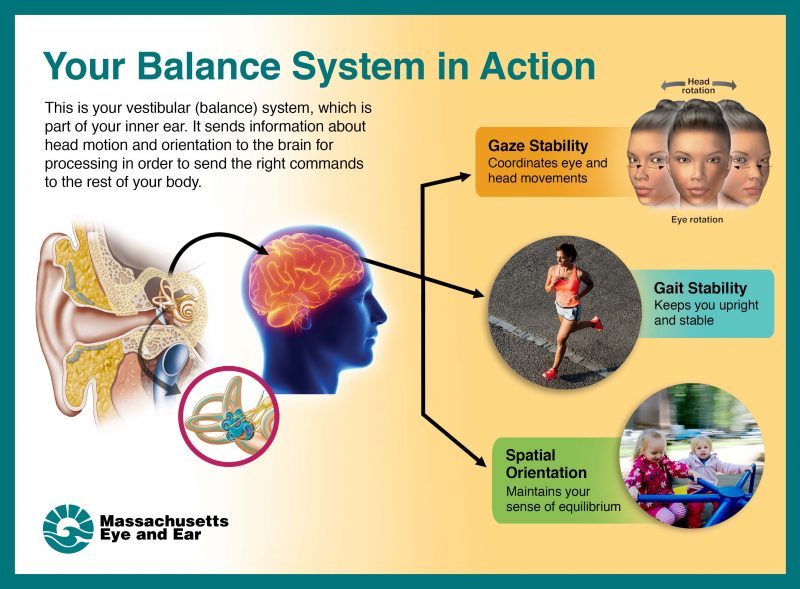Often referred to as our “sixth sense,” balance relies on input from several areas of the body to keep you from falling — the inner ear, the eyes, the muscles and joints in your leg and spine.
Have you ever wondered why you are able to stand upright or walk across a room without falling?
Well, your vestibular (balance) system has a lot to do with that.
This sensory system is different from all other senses in your body. Each of your other senses has only one input: You see with your eyes, smell with your nose, taste with your tongue, etc.
The vestibular system, however, has several sensory inputs: Balance organs of your inner ear (five on each side), visual inputs and inputs from the muscles and joints in your legs and spine. These inputs unite in the balance centers of the brain to give you a sense of balance. This forms a “sixth sense” as it sends information about head motion and orientation to the brain for processing in order to send the right commands to your different organs for performing daily life activities.

In action, our vestibular system has three main functions: gaze stability, gait stability, and spatial orientation. We checked in with Dr. Steven Rauch, Director of the Vestibular Division at Mass Eye and Ear, to learn more about these functions and why they are important.
Gaze Stability
More than meets the eye. Stare at a fixed point on the wall in front of you while moving your head from side to side. Notice how your eyes rotate in order to stay fixed on that point, rather than moving with your head? That would be because of your vestibular system. As you turn your head, your vestibular system helps rotate your eyes. This is called the vestibule-ocular reflex.
Gait Stability
On your mark… Maintaining an upright stance on one or two feet requires constant communication between the sensory signals from the feet, legs and spine to the brain. These muscle signals are sent to the brain and then back down to make adjustments in your body that will keep you upright and stable in a variety of activities—like keeping you steady while running.
Spatial Orientation
Round and round we go! The vestibular system helps you perceive which way you are spinning on a merry-go-round, which way you are tilting on a boat and simply, which way is up. These perceptions contribute to your sense of equilibrium (state of physical balance) and keep you safe from falling.
Next time you are walking around or enjoying a boat ride, think about how your vestibular system is working to help you maintain your stability and sense of balance!
If you experience dizziness or sense of imbalance, discuss this with your doctor and consider seeing an ear, nose and throat specialist for evaluation.




See and correct: “taste you’re your tongue”
Thank you very much for this, John. We’ve corrected the post.
What can I do to improve my sense of balance? Thank you
Hi Robert, please watch the video in this blog post for some concrete tips on maintain balance throughout the “golden years.” https://focus.masseyeandear.org/the-miracle-of-balance-what-happens-when-the-system-gets-out-of-sync/
Hi I’m in my thirty almost in the middle however I broke my wrist on left hand I am naturally ambidextrous I using right a lot an straining it feel body out balance with balance got any ideas
thank you for the information
What is meant by “sixth sense” in the context of the vestibular system, and why is it called that?